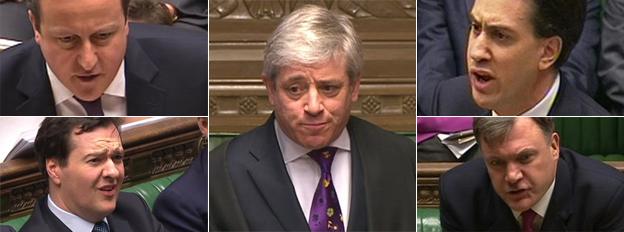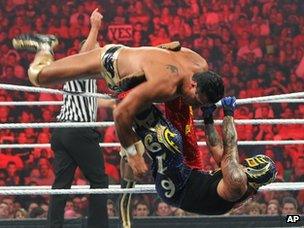Do we really hate MPs getting rowdy?
- Published
- comments

Voters are often deployed as foot-soldiers in Speaker John Bercow's uphill battle against raucousness at Prime Minister's Questions. But is he right to believe we disapprove so strongly?
"It is not acceptable to shout down either the prime minister or the leader of the opposition. The public have a very low opinion of that kind of behaviour."
That was one attempt to quell the noise in the most recent 30-minute question session, known in Westminster as PMQs, when David Cameron takes questions from the opposition leader and other MPs.
But as it turned out, the Speaker's put-down of one badly behaved MP provided the most watched video clip of the session on the BBC website.
So could it be that the public does rather enjoy a bit of verbal aggro after all?
'Deafening'
Unfortunately there appears to have been no rigorous polling on the subject, so we have had to to rely on anecdotal evidence - and that seems to support both sides of the argument.
A spokesman for the Speaker - the referee who controls the debates and other proceedings in the Commons - says members of the public send "two or three letters every week" to Mr Bercow complaining about MPs' conduct at prime minister's questions.
"The noise in the chamber is actually quite deafening," he says.
"Occasionally there have been school groups visiting who have been taken aback." Some of the teachers "thought it wasn't a great example for their pupils", he adds.
The spokesman recalls numerous public question sessions with the Speaker being dominated by criticism of bad behaviour in the chamber.
"They don't think it's very good reflection of the House. What they don't understand is that it's not like that all the time.
"They don't see all the line-by-line scrutiny, they don't see the calmer, more cerebral stuff."
Director of polling firm ICM Martin Boon also thinks that voters are "not impressed" by MPs seeking "petty party political advantage" at PMQs.
"We've conducted many political focus groups over the years, and a constant theme has always been a disappointment with politicians who engage in yah-boo politics," he says.
'Pouring blood'
The details of such discussions are kept under wraps, but he concludes - in general terms - that focus groups would rather MPs "debated the issues sensibly" than behave like children.
Some MPs are attuned to different signals from voters. TV ratings soar for PMQs, they note.

David Cameron was surprised by Ed Miliband's new line of attack
Labour MP Stephen Pound describes the Speaker's assessment of the public's attitude towards ill-tempered Commons clashes as "absolute rubbish".
"They love it. They watch prime minister's questions because it is the World Wrestling Federation without the subtlety.
"If there were blood pouring down the aisle they'd be even happier."
In addition to its entertainment value, the wall of sound that frontbenchers must clamber over to be heard serves a useful constitutional purpose too, Mr Pound argues, enabling backbench MPs to weed out weak leaders.
"Some leaders don't recover" from the reputational damage inflicted upon them at PMQs, he notes, citing John Major and Gordon Brown as evidence.
As further proof of the extent of public interest in the "pressure cooker" environment of PMQs, he adds that MPs' allocation of tickets to watch the event are always "hugely over-subscribed".
'Overwhelmingly contradictory'
"No-one has ever contacted me saying they love hearing Demosthenian arguments in the Commons - they say: 'I love it when [veteran Labour MP] Dennis Skinner is rude.'"
The Conservatives' Jacob Rees-Mogg also disagrees with Mr Bercow.
PMQs noise 'louder than Deep Purple' says Speaker John Bercow
"I'm a great fan of the Speaker - he's a very good Speaker, and stands up for backbenchers," he says. "But I don't think he's right on this point.
"I think the electorate expects people to feel strongly about the issues that affect their lives very greatly."
Director of think tank the Hansard Society Dr Ruth Fox has an explanation for these contrasting conclusions: public opinion is "overwhelmingly contradictory" on the subject.
"On the one hand people like the theatre of PMQs. On the other, they really don't like the fact that they perceive MPs not to be taking the issues seriously," she says.
Dr Fox's latest research shows a marked increase in the proportion of people who agree with the propositions that Parliament "holds government to account" and "debates and makes decisions about issues that matter to me".
Punch and Judy
But she suspects this is in spite of raucousness in the Commons chamber rather than because of it.
In fact, she attributes the change to the increased profile and effectiveness of select committees in recent years - where the atmosphere of forensic investigation is radically different from the crucible of the Commons.
"One of the dangers for MPs," she warns, "is that because of the theatrical element [of Commons debate], they think the public are laughing with them but all too often the public are laughing at them."
If the public is conflicted on the subject, it's fair to say that some notable politicians - over the passage of time - have been too.
Prime Minister David Cameron promised, during his 2005 campaign to become Tory leader, to bring an end to "Punch and Judy politics".
But in 2011 he admitted: "I will absolutely hold up my hand... and say you're quite right, this is a promise I have not been able to deliver - I 'fess up to you if you like."
He's not the only one to have altered his stance.
Mr Pound remembers a former political rival who was "exceptionally badly behaved" during the 1997-2001 Parliament.
He was described by contemporary sketchwriters as "one of the Tories' most notorious hooligans", as "the Tories' very own rottweiler", and accused by reporters of "bellowing" at Labour MPs on several occasions.
In 2001, he was forced by Speaker Michael Martin to withdraw the "unparliamentary" epithet "con man!", which he had directed towards the then Chancellor Gordon Brown.
His name? John Bercow.
At that time, the Speaker conceded in 2010, external, his behaviour had been "spectacularly bad. Not just bad, but bad on an industrial scale."